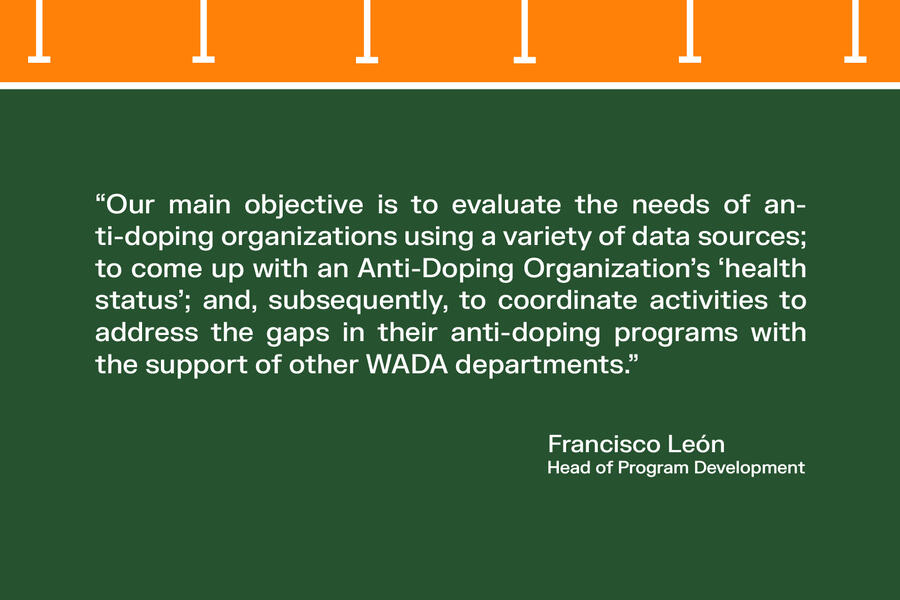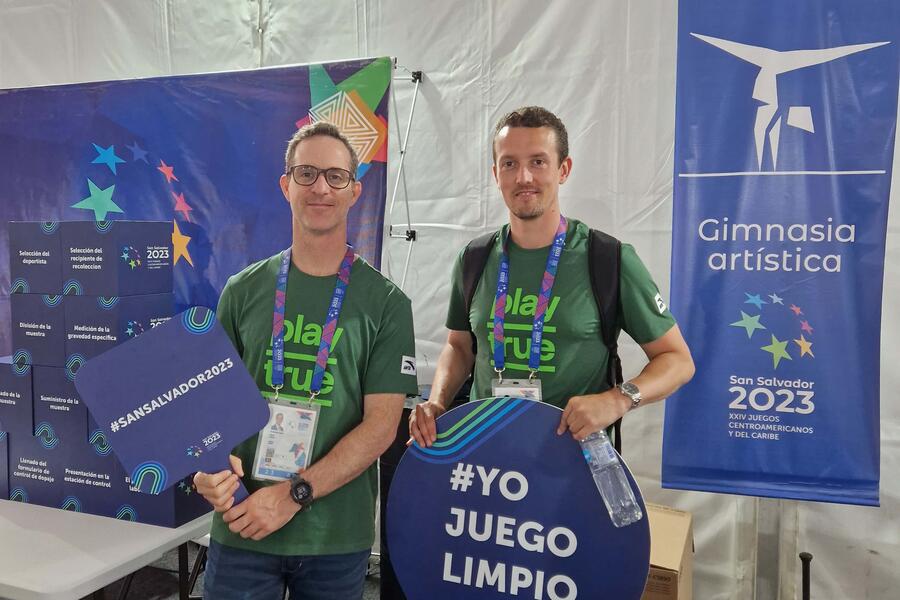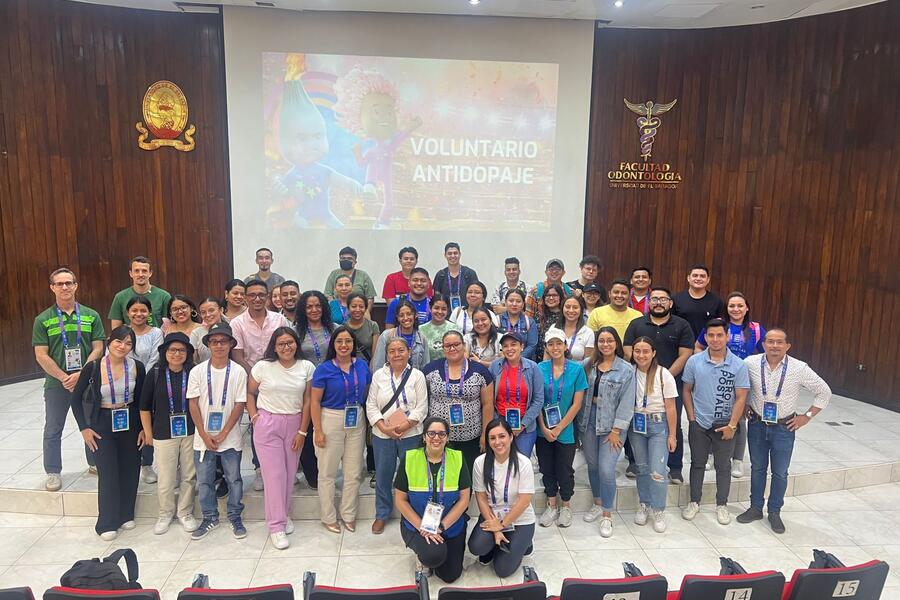Story
Spotlight - WADA Program Development is collaborating to support the growth of anti-doping programs worldwide

In this latest edition of ‘Spotlight’, which keeps stakeholders up to date on the activities being carried out by the World Anti-Doping Agency (WADA) team and its partners, we look at how WADA Program Development is supporting the growth of anti-doping programs worldwide. This and previous ‘Spotlight’ features are available here.
Program Development has been an integral part of WADA’s mission since 2004, originally through the Regional Anti-Doping Organization (RADO) Program and the National Anti-Doping Organization (NADO) Program. In 2021, WADA introduced a new matrix organizational model and structure aimed at supporting delivery of the Agency’s 2020-2024 Strategic Plan. This included creation of a transversal Program Development Impact Area with dedicated staff and strategy, which benefits all Anti-Doping Organizations (ADOs), i.e. NADOs, RADOs, International Federations (IFs), and Major Event Organizations (MEOs).
Led by Francisco León, Head of Program Development, this impact area is responsible for delivering the following initiatives in line with the ‘Lead’ and ‘Grow Impact’ priorities of WADA’s Strategic Plan:
- Assessing the health of ADO programs from compliance and development data;
- Providing a high-level view of the global anti-doping landscape by identifying development trends and issues; and
- Helping find potential ways to address these gaps in coordination with WADA’s other departments (Functional Areas and Regional Offices).
Francisco León said: “Program Development plays a key role within WADA’s structure. Like the other impact areas, it develops projects and initiatives across multiple departments. Our main objective is to evaluate the needs of anti-doping organizations using a variety of data sources; to come up with an Anti-Doping Organization’s ‘health status’; and, subsequently, to coordinate activities to address the gaps in their anti-doping programs with the support of other WADA departments. Over the past years, Program Development has coordinated several important programs and projects that have and are delivering results for stakeholders.”
ADO Programs Assessment Framework (ADOPAF)
Eimear O’Leary-Barrett, Manager, Program Development and ADOPAF program leader said: “The ADO Programs Assessment Framework continuously assesses the health of ADO programs from compliance and development data, providing a high-level view of individual programs and the global anti-doping landscape by identifying trends and issues. Program Development then contributes to the design and coordination of initiatives to address these gaps with other WADA departments and key stakeholders.”
The ADOPAF plays a vital role in assessing whether ADO programs around the world are meeting the requirements of the World Anti-Doping Code and International Standards, as ADOs are the ones producing anti-doping policies, managing resources, and delivering anti-doping programs.
Leon continued: “Following any particular assessment, Program Development coordinates actions by considering priorities. We ask ourselves whether we have a global development issue that involves multiple functional areas, or whether there is a specific concern that needs to be addressed within one area or ADO. Once we have answered this question collectively, we take the necessary steps and follow up by evaluating the impact of the particular project’s outcomes. Looking ahead, one of our priorities will be to strengthen our data analytics approach with WADA’s Data Analytics Unit (DAU). The goal will be to expand the ADOPAF with support from the DAU, which will allow us to develop benchmarking for measuring anti-doping programs.”
Major Event Anti-Doping Legacy Program
The Major Event Anti-Doping Legacy (MEAL) program is one of Program Development’s latest programs. Its goal is to capitalize on the opportunity presented by Major Events to boost anti-doping development for all ADOs involved, while promoting clean sport in regions of the world where anti-doping activity is otherwise limited. The MEAL program takes advantage of these opportunities to build awareness and support ADOs in developing and implementing capacity and capability building activities based on the needs and the goals identified and leave a strong legacy for all ADOs involved.
Valentin Capelli, Manager, Sport Movement Relations, and MEAL Program Leader said: “The MEAL Program will play a pivotal role within Program Development over the years to come. WADA continues to build on the on-site resources it offers at Major Events. Alongside our Independent Observer and Athlete Engagement programs, the MEAL Program adds a layer of organizational support that focuses on operational legacy building; such as: strengthening MEO and NADO development; training for new local and regional Doping Control and Education Officers; implementing processes to improve testing, Results Management and Therapeutic Use Exemptions (TUE) processing, etc. Ultimately, the goal is to make impactful changes and implement frameworks in regions to foster robust, efficient and successful anti-doping programs.”
This year, the MEAL Program was rolled out at the Central American and Caribbean Games, which were held in El Salvador and the Dominican Republic from 23 June to 8 July 2023; and, the Pan Arab Games in Algeria from 5 to 15 July. It will also be implemented at the Francophonie Games, which will take place in Kinshasa, in the Democratic Republic of the Congo from 28 July to 6 August 2023.
Program Development Projects
On top of the ADOPAF and the MEAL Program, Program Development also has a number of other projects in the works, notably:
- The Testing Programs Project for Priority ADOs, which assists ADOs facing issues in the development and implementation of sustainable World Anti-Doping Code compliant testing programs;
- The Results Management Continental Panels Project, which is a two-year long effort that will become a regular departmental activity. It focuses on supporting RADOs and NADOs in the Americas, Africa and Asia/Oceania in creating and maintaining Results Management continental structures; and
- The TUE Development Project, which aims to enhance TUE infrastructure, build TUE capability and raise awareness on prohibited substances and TUEs.
Leon concluded: “The different types of projects that Program Development undertakes shows the breadth of this impact area. We work with all types of ADOs and dive into all aspects of anti-doping. It highlights the importance of implementing a collaborative, shared approach – not only within WADA but with our external stakeholders, so that we can maximize the use of resources, tools and expertise for the good of athletes worldwide.”




